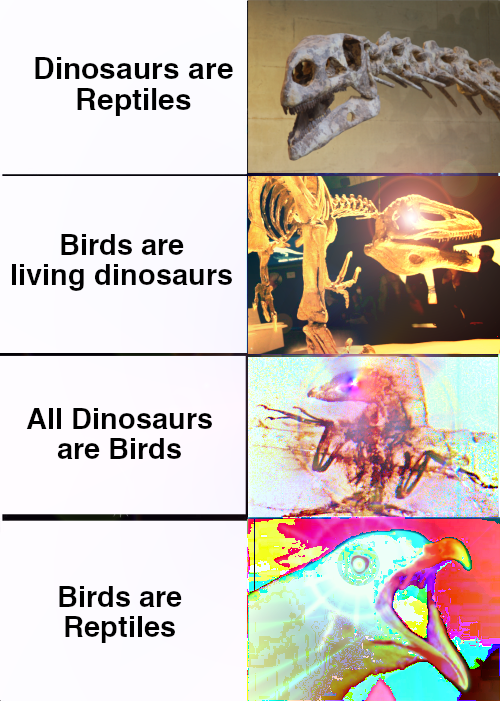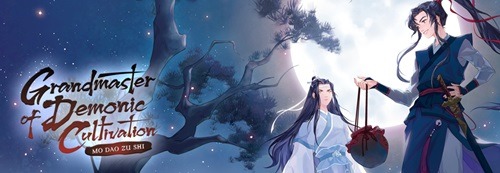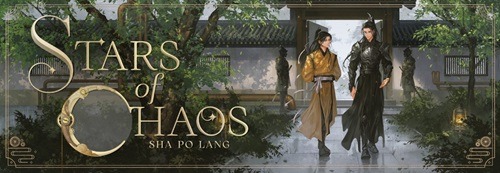CLADISTICS Ruined My Life

CLADISTICS ruined my life
More Posts from Weishenmewwx and Others
Stars of Chaos 杀破狼
Vol 2, Notes 7, pages 339 - 366.
Another eight notes...

The idiom for "too late" in Chinese is 黄花菜都凉了 "The Yellow Lilly (chrysanthemum? Yellow lily?) dish is already cold", which I had to look up.
Apparently, there was a time and place in ancient China where, when the fancy nobles would throw a banquet, they would serve 黄花菜 as the final dish. If you delayed attending so long that the 黄花菜 was already cold, then you had completely missed the banquet. You were too late.

牲口 is, technically, "draught animal" or "beast of burden," but I'm pretty sure what Priest means here is "those cold-blooded war beasts."

top: I think of it as two separate, unrelated, consecutive actions.
bottom: 铁膝飞足, iron knees flying feet, is so easy to read in Chinese. (This is the first time I've ever seen the word "poleyns.")

top: "young and inexperienced" in Chinese here is 初出茅庐, "first time out of the thatched cottage."
初出茅庐 is the coolest little idiom. So, in the Three Kingdoms period, there was a scholar called Zhuge Liang. Liu Bei, leader of the Shu Han, begged Zhuge Liang to become his advisor and, after three visits, Zhuge Liang agreed. This was the first time that Zhuge Liang accepted such an advisory position, and the "first time" that he left his thatched cottage (it was wartime. There was a lot of travel involved with advising a king/warlord).
Anyway, Zhuge Liang was a genius and immediately won a lot of battles through superior strategy.
next: for "dig in his heels before the capital," I feel like that could be more clearly written as "hold the capital."
next: regarding "unsalvageable situation," he's talking about his relationship with the emperor.
last: "No eggs remain when the nest overturns" is a common idiom, 覆巢之下无完卵。 We're all in it together.

"running to the market" 赶集 is a way to describe how things are noisy and busy and people are running back and forth (not bright and merry with people buying gifts for each other).

I think... the indescribable smell is the mix of gunpowder and blood...

If you don't know already, the Origin Myth for Where Humans Come From is that the half-snake goddess Nuwa made humans out of clay :)

I'm not sure why, but in English I thought that one of the Western soldiers was laughing; but in Chinese it's really clear that none of the soldiers are laughing.
Four more...
My DanMei Literary Adventure Masterpost
Stars of Chaos - All Notes Links
杀破狼 Stars of Chaos Extras! Are not (complete) on every website!
I finally finished my very very slow read and immediately re-read of Priest’s Sha Po Lang 杀破狼 Stars of Chaos. The second time I read it, zhenhunxiaoshuo .com had a bad day so I switched over to enjing .com (please forgive me. I am not so fluent as to be able to navigate jjwxc . net)
And then I realized when I “finished” reading on enjing that I was still missing two scenes!
So, Chinese-language readers of 杀破狼 on non-jjwxc websites: be sure to read the “Gu Yun is falls deathly ill on his way to escort 加莱荧惑 back to the 18 Tribes” chapter and the “Chang Geng takes Gu Yun home by train” chapters!! They are all on
https://www.zhenhunxiaoshuo.com/47429.html

I feel like I am under attack here...he certainly killed me...no question

Now you know — view on Instagram https://ift.tt/3AGm34f

Yelling about this again since it's a big pet peeve of mine but please be aware!!! that "kill the wolf" is not!! a valid translation of Sha Po Lang!! it's not even a "literal translation" it's just MTL gibberish trying to make sense of a term with no English translation
pasting the explanation I gave on twt below the cut-
杀破狼/sha po lang corresponds to three different stars 七杀/qi sha ('seven killings'), 破军/po jun ('vanquisher of armies'), and 贪狼/tan lang ('greedy wolf'), which are significant in a system of Chinese astrology called 紫微斗数/zi wei dou shu
when these three stars appear in certain positions in a natal star chart, they compose the 'sha po lang' star formation, which foretells change and revolution, a turbulent fate which could lead to one making a name for oneself in chaotic times, or ending up destitute
famous generals are often born under this star formation as well - as you can see, there are a lot of ties with the themes of the novel itself
but, however, it doesn't really have a proper english translation, hence why i'm in favor of the 'stars of chaos' version of the title
if you want to look at the actual stars (look closer at the vol 1 cover for a little easter egg!)
qi sha = polis/mu sagittarii
po jun = alkaid/eta ursae majoris
tan lang = dubhe/alpha ursae majoris
thank you minirant complete
My Danmei 耽美 Literary Adventure
Seven Seas Chinese Danmei novels, Notes Masterlist
Some of my favorite books, especially, The Grandmaster of Demonic Cultivation, The Husky and His White Cat Shizun, Stars of Chaos, and Guardian, are now officially in English! Thank you, Seven Seas.
These notes are here to help friends who may not speak Chinese or have enough Chinese cultural background to understand the nuances presented in these works, or are just getting confused with all the different terms of address.
Please forgive me if I have missed anything, and dm or comment if you have anything to add!

魔道祖师 Grandmaster of Demonic Cultivation
by MXTX

二哈和他的白猫师尊 The Husky and His White Cat ShiZun
by Meatbun 肉包不吃肉 (Rou Bao Bu Chi Rou)
Usage of the word "Master" vs "Teacher"
How to pronounce people's names (bc it does NOT follow the rules of English pronunciation)
Book Annotations

杀破狼 Stars of Chaos
by Priest
Vol 1-4 are here!
(Volume 5 notes will arrive next.)

镇魂 Guardian
by Priest
Coming eventually :)
https://youtu.be/X424BWOczS4
I now have something to aspire to. Imagine: a whole library of Just MXTX, or even Just MDZS ❤️
Stars of Chaos 杀破狼 Vol 1, Notes 3
By Priest. Notes on the 7 Seas English translation.
Pages 148 - 202

As they mention in the Appendix, Priest doesn’t use naming conventions in conventional ways. She also never introduces characters’ courtesy names - she just uses them and assumes that you’ll figure out who it belongs to eventually and will totally remember it three / thirteen chapters later.
More under the cut

Chinese uses (在我)身上 a lot to mean “at me” “to me” “on me.”

On being a laughingstock of a godfather, here are those 12 words, 2 commas: “头回给人当义父,当不好,见笑。”
As for the note at the top of this page: 他本想要照顾一辈子的小义父化成泡影. While the text reads “the godfather (that he had wanted to take care of for his entire life) became the shadow of foam,” the meaning is closer to “his idea of his godfather (the man he loved deeply and wanted to take care of the rest of his life), that idea dissolved away as surely as the shadow of foam dissolves into nothingness.”

The fun part of this (translation) is that in Chinese, this entire paragraph is all just one sentence. 5 commas, one em dash. You’d think it would be more difficult to understand with so little punctuation, but it actually works very well and very clearly - descriptions that require a whole separate sentence in English are just modifiers in Chinese; and parts of speech that have to be specified in English are very clearly implied in Chinese, with no ambiguity at all.

Gu Yun never treated any of the princes badly. He was just a difficult child himself.


It’s clear in the Chinese that Chang Geng lost his temper because the Celestial Wolf Prince was speaking irreverently of / to Gu Yun, and no one is allowed to be rude to Gu Yun! (Except maybe Shen Yi, but that’s a different, more familial, type of irreverence.)

Yes. Hanlin Academy. Remember this phrase - you’ll see it, like, twice more. Book-smart kids who tested into imperial government.

They like to use the word “puppet,” whereas anime-fans might be more used to “robots” or “mecha.” Same same.

Stars of Chaos - All The Notes List
All The Seven Seas Books Masterlist
-
 thehatchette liked this · 2 weeks ago
thehatchette liked this · 2 weeks ago -
 punkgeekcryptid reblogged this · 2 weeks ago
punkgeekcryptid reblogged this · 2 weeks ago -
 punkgeekcryptid liked this · 2 weeks ago
punkgeekcryptid liked this · 2 weeks ago -
 scarecrowmax reblogged this · 2 weeks ago
scarecrowmax reblogged this · 2 weeks ago -
 meeps-chan liked this · 4 weeks ago
meeps-chan liked this · 4 weeks ago -
 bramblegeist reblogged this · 4 weeks ago
bramblegeist reblogged this · 4 weeks ago -
 whatthefunkyfuck liked this · 4 weeks ago
whatthefunkyfuck liked this · 4 weeks ago -
 lalalasocks reblogged this · 1 month ago
lalalasocks reblogged this · 1 month ago -
 fishingisuniversal liked this · 1 month ago
fishingisuniversal liked this · 1 month ago -
 vo-kopen reblogged this · 1 month ago
vo-kopen reblogged this · 1 month ago -
 ohboywonder reblogged this · 1 month ago
ohboywonder reblogged this · 1 month ago -
 endlace liked this · 1 month ago
endlace liked this · 1 month ago -
 dragonictitan reblogged this · 1 month ago
dragonictitan reblogged this · 1 month ago -
 the-bridge-over-the-troll liked this · 1 month ago
the-bridge-over-the-troll liked this · 1 month ago -
 hellyeahheroes reblogged this · 1 month ago
hellyeahheroes reblogged this · 1 month ago -
 sirdukeofearl2 reblogged this · 1 month ago
sirdukeofearl2 reblogged this · 1 month ago -
 bigtonguebiollante reblogged this · 1 month ago
bigtonguebiollante reblogged this · 1 month ago -
 tinierpurplefishes reblogged this · 1 month ago
tinierpurplefishes reblogged this · 1 month ago -
 tinierpurplefishes liked this · 1 month ago
tinierpurplefishes liked this · 1 month ago -
 mountainbirb reblogged this · 1 month ago
mountainbirb reblogged this · 1 month ago -
 woolen-feathers reblogged this · 1 month ago
woolen-feathers reblogged this · 1 month ago -
 nunyo-bizznez reblogged this · 1 month ago
nunyo-bizznez reblogged this · 1 month ago -
 stracciatellino liked this · 1 month ago
stracciatellino liked this · 1 month ago -
 arsonandcrime liked this · 1 month ago
arsonandcrime liked this · 1 month ago -
 arsonandcrime reblogged this · 1 month ago
arsonandcrime reblogged this · 1 month ago -
 asthrapolaris liked this · 1 month ago
asthrapolaris liked this · 1 month ago -
 ravemunch liked this · 1 month ago
ravemunch liked this · 1 month ago -
 happilymassivehypocrite reblogged this · 1 month ago
happilymassivehypocrite reblogged this · 1 month ago -
 cacheth liked this · 1 month ago
cacheth liked this · 1 month ago -
 childoffantasy reblogged this · 1 month ago
childoffantasy reblogged this · 1 month ago -
 just-my-hyperfixations liked this · 1 month ago
just-my-hyperfixations liked this · 1 month ago -
 anonymouse-fiction liked this · 1 month ago
anonymouse-fiction liked this · 1 month ago -
 polwigle reblogged this · 1 month ago
polwigle reblogged this · 1 month ago -
 sirzenithknight9 reblogged this · 2 months ago
sirzenithknight9 reblogged this · 2 months ago -
 last-flight-of-dickarus liked this · 2 months ago
last-flight-of-dickarus liked this · 2 months ago -
 void-bound-souls liked this · 2 months ago
void-bound-souls liked this · 2 months ago -
 le-poofe liked this · 2 months ago
le-poofe liked this · 2 months ago -
 namelessokami reblogged this · 2 months ago
namelessokami reblogged this · 2 months ago -
 nopeouttahere liked this · 2 months ago
nopeouttahere liked this · 2 months ago -
 catsinspacesuits reblogged this · 2 months ago
catsinspacesuits reblogged this · 2 months ago -
 catsinspacesuits liked this · 2 months ago
catsinspacesuits liked this · 2 months ago -
 hopefulprunefishhands liked this · 2 months ago
hopefulprunefishhands liked this · 2 months ago -
 squeakthefangirl reblogged this · 2 months ago
squeakthefangirl reblogged this · 2 months ago -
 squeakthefangirl liked this · 2 months ago
squeakthefangirl liked this · 2 months ago -
 ringsofdragons reblogged this · 3 months ago
ringsofdragons reblogged this · 3 months ago -
 confused-pie reblogged this · 3 months ago
confused-pie reblogged this · 3 months ago -
 confused-pie liked this · 3 months ago
confused-pie liked this · 3 months ago -
 ernilthur reblogged this · 3 months ago
ernilthur reblogged this · 3 months ago -
 ernilthur liked this · 3 months ago
ernilthur liked this · 3 months ago -
 bonodono liked this · 3 months ago
bonodono liked this · 3 months ago
